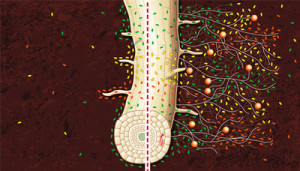Did you know that in one teaspoon of living soil there are 100 million to 1 billion bacteria, 1 mile to 40 miles of fungal hyphae, and 1,000-100,000 protozoa? These organisms provide a variety of benefits for the plant. The bacteria eat the exudates (simple sugars, carbons, carbohydrates) that the plant puts out through its roots, who are then eaten by the protozoa, and what is excreted by the protozoa is plant available nutrients. Beneficial fungi protect the plant from pathogens and harmful microbes, as well as creating pathways in the soil that bring water and nutrients back to the plant from larger distances. Bacteria and fungi work together in decomposing organic material and making the nutrients available to plant. This is a sustainable process that allows for the growth of healthy plants, without the need for fertilizers, pesticides, and other chemicals. After all, there’s no one out there putting fertilizers on our rainforests, yet take a look at how successfully plants are growing in these microbial-rich environments.
There are so many beneficial microbes and fungus’ out there, to break down each one would take a book. So, we are going to focus on a couple of the key beneficials out there for your plants.
Mycorrhizae are a great beneficial to roots. Mycorrhizae are able to create a vast connection between the roots of a plant and with the soil around them, which allows for the fungus to uptake nutrients such as nitrogen and phosphorus for the plant and increase the surface area of the roots
Streptomyces lydicus has been analyzed in labs and has been found to be an essential fungus at eliminating pythium. It doesn’t just eliminate it, it eats it and its byproduct is innoculants designed specifically to protect the roots.
Compost Tea is as how it sounds. Steep finished compost in water while adding aeration to breed the beneficial microbes and fungi that are essential to root healthiness. The addition of the aeration is really what makes the tea come alive, literally. By adding oxygen while stirring the water you are giving the beneficials the required amount of oxygen for them to thrive and reproduce. Unlike actual compost, the tea does not provide any nutrient value, therefore it cannot be substituted for your feeding schedule. To read more on compost tea, check out our blog “Trust me…this is everyone’s cup of tea.”
We brew our own compost tea here at the store every Sunday and give a gallon away (per customer) for free from 11 am – 4 pm. So come in, get some tea, and recommendations on what other beneficials would help your regimen grow even stronger. Remember…We Grow better!

